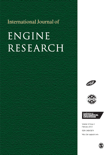
International Journal of Engine Research
Scope & Guideline
Shaping the Future of Engine Technology and Design
Introduction
Aims and Scopes
- Performance Optimization of Internal Combustion Engines:
Research that explores various methods to enhance the performance of internal combustion engines, including optimization of fuel injection strategies, combustion chamber design, and engine management systems. - Emissions Reduction Technologies:
Studies focused on innovative technologies and strategies for reducing harmful emissions from internal combustion engines, such as selective catalytic reduction, exhaust gas recirculation, and advanced combustion modes. - Alternative Fuels and Fuel Blending:
Investigations into the use of alternative fuels, including biofuels, hydrogen, and synthetic fuels, as well as the impact of fuel blending on engine performance and emissions. - Computational Modeling and Simulation:
Development and application of computational models, including CFD and multi-physics simulations, to predict engine behavior, optimize design, and analyze combustion processes. - Experimental Investigations and Diagnostics:
Conducting experimental studies to validate theoretical models, assess engine performance, and diagnose issues in engine operation through advanced measurement techniques. - Tribology and Lubrication Studies:
Researching the interaction between engine components, focusing on lubrication, wear, and friction to improve engine durability and efficiency. - Thermal Management and Efficiency:
Studies aimed at improving thermal efficiency through advanced cooling techniques, thermal barrier coatings, and waste heat recovery systems.
Trending and Emerging
- Hybrid and Electrified Engine Systems:
Research is increasingly focused on hybrid and electrified engine systems, aiming to combine the benefits of internal combustion engines with electric propulsion for improved efficiency and lower emissions. - Advanced Combustion Strategies:
Emerging combustion strategies, such as reactivity-controlled compression ignition (RCCI) and homogeneous charge compression ignition (HCCI), are gaining attention for their potential to enhance efficiency and reduce emissions. - Machine Learning and AI Applications:
The application of machine learning and artificial intelligence in engine research is on the rise, enabling predictive modeling, optimization, and real-time control of engine performance. - Sustainable and Renewable Fuels:
Increased interest in sustainable and renewable fuels, including hydrogen and biofuels, reflects a broader push towards decarbonization and energy transition in the transportation sector. - Real-Time Monitoring and Diagnostics:
Research on real-time monitoring and diagnostic systems is trending, focusing on advanced sensor technologies and data analytics to enhance engine performance and reliability. - Thermal Barrier Coatings and Advanced Materials:
The use of thermal barrier coatings and advanced materials is becoming more prominent, aimed at improving engine durability and thermal efficiency.
Declining or Waning
- Conventional Diesel Engine Technologies:
Research focusing on traditional diesel engine technologies is declining as attention shifts towards cleaner alternatives and hybrid systems, reflecting a broader industry trend towards sustainability. - Basic Engine Design Principles:
The emphasis on fundamental engine design principles is decreasing as more researchers focus on complex systems and innovative technologies, indicating a shift towards advanced methodologies. - Static Emission Testing:
The focus on static emission testing methods has waned in favor of dynamic and real-world testing scenarios that better reflect actual engine operation and emissions performance. - Single Fuel Strategies:
Research on engines operating with a single fuel type is declining as dual-fuel and alternative fuel strategies gain traction, driven by the need for flexible and sustainable fuel options.
Similar Journals
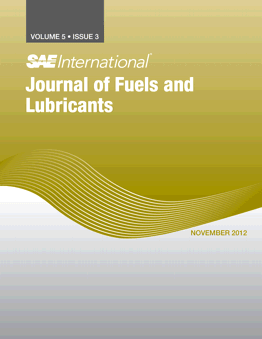
SAE International Journal of Fuels and Lubricants
Connecting Academia with Industry for Impactful ChangeWelcome to the SAE International Journal of Fuels and Lubricants, a leading peer-reviewed publication dedicated to advancing knowledge in the crucial fields of fuel technology and lubrication science. Published by SAE International, this journal serves as a vital resource for researchers, industry professionals, and students engaged in the study and application of innovative fuels and lubricants. With an impact factor indicative of its importance, the journal is ranked in the Q3 category for both Fuel Technology and Pollution, highlighting its critical role in addressing global energy and environmental challenges. Covering a range of topics from fundamental research to practical applications, the journal not only contributes to academic discourse but also serves to inform industry practices. Our publication spans the converged years from 2009 to 2024, reflecting a commitment to continuous scholarly contribution. While currently operating under a traditional access model, the journal aims to foster an inclusive environment for discourse in the rapidly evolving fields of energy and environmental science.

International Journal of Heavy Vehicle Systems
Advancing Knowledge in Heavy Vehicle TechnologiesThe International Journal of Heavy Vehicle Systems, published by INDERSCIENCE ENTERPRISES LTD in the United Kingdom, is a pivotal resource for professionals and researchers in the fields of automotive and mechanical engineering. With an ISSN of 1744-232X and an E-ISSN of 1741-5152, this journal serves as an academic platform dedicated to exploring the latest innovations and technologies pertaining to heavy vehicle systems, including design, performance, and environmental impact. Boasting a Category Quartile of Q3 in both Automotive and Mechanical Engineering as of 2023, it ranks among the growing body of literature in these disciplines, indicative of its commitment to quality research. The journal is widely accessible through diverse open access options, encouraging the dissemination of knowledge within the academic community. By publishing cutting-edge studies and reviews, the International Journal of Heavy Vehicle Systems plays an essential role in advancing our understanding of heavy vehicle technologies, providing invaluable insight for engineers, researchers, and students eager to contribute to this dynamic field.
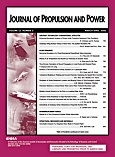
JOURNAL OF PROPULSION AND POWER
Driving the Future of Aerospace Engineering ForwardJOURNAL OF PROPULSION AND POWER, published by the American Institute of Aeronautics and Astronautics, is a premier peer-reviewed journal dedicated to the advancement of knowledge in the fields of aerospace engineering, mechanical engineering, and fuel technology. With an impressive impact factor and ranked in the Q1 and Q2 categories for various relevant fields, the journal serves as a vital resource for researchers, professionals, and students alike who are looking to stay abreast of the latest innovations and breakthroughs in propulsion systems and power generation methodologies. Established in 1985, the journal covers a wide range of topics, ensuring a comprehensive understanding of propulsion technologies from atmospheric to space applications. Its robust Scopus rankings highlight its significance in the academic community, establishing it as a leading forum for sharing pivotal research findings and fostering collaborative dialogues that drive the aerospace industry forward. Located in Reston, Virginia, the journal does not currently offer open access options, yet it remains accessible to a vast audience via academic institutions and libraries. As we move further into the 21st century, the JOURNAL OF PROPULSION AND POWER continues to be an indispensable tool for the exploration and evolution of propulsion and power systems.
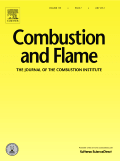
Combustion and Flame
Igniting Innovation in Combustion ScienceCombustion and Flame is a premier academic journal published by Elsevier Science Inc, dedicated to advancing the field of combustion science. Since its inception in 1957, this journal has consistently provided a platform for rigorous research and groundbreaking discoveries in the realms of Chemical Engineering, Chemistry, and Energy Engineering, illustrating a significant Q1 ranking across multiple categories, including Fuel Technology and Physics. With an impressive Scopus ranking, comprising the top 10% in fields such as General Physics and Astronomy, and General Chemical Engineering, Combustion and Flame serves as a critical resource for researchers, professionals, and students aiming to explore the complexities of combustion phenomena and their applications. Although it does not offer open access, the journal is known for its comprehensive articles and innovative research papers, fostering scholarly dialogue and the development of emerging technologies. The journal aims to connect researchers globally, ensuring that important findings are shared and disseminated effectively.

INTERNATIONAL JOURNAL OF AUTOMOTIVE TECHNOLOGY
Connecting Global Minds in Automotive TechnologyINTERNATIONAL JOURNAL OF AUTOMOTIVE TECHNOLOGY, published by the Korean Society of Automotive Engineers (KSAE), stands as a key platform in the field of Automotive Engineering since its inception in 2000. With an ISSN of 1229-9138 and an E-ISSN of 1976-3832, this esteemed journal aims to disseminate cutting-edge research, innovative methodologies, and advancements in automotive technology. As of 2023, it holds a distinguished Q2 quartile ranking in the Automotive Engineering category on Scopus, featuring a competitive rank of 48/125, illustrating its recognition among peers and the academic community. The journal also enjoys a global readership despite its base in South Korea. Researchers, professionals, and students in the automotive sector are encouraged to contribute to this journal, thus promoting collaboration and knowledge exchange that fosters innovation and progress in automotive engineering. Additionally, the journal is committed to enhancing accessibility of knowledge across boundaries and aims to continue serving as a catalyst for academic growth up to the year 2024.
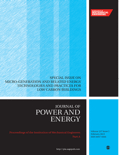
PROCEEDINGS OF THE INSTITUTION OF MECHANICAL ENGINEERS PART A-JOURNAL OF POWER AND ENERGY
Elevating Standards in Power and Energy ResearchPROCEEDINGS OF THE INSTITUTION OF MECHANICAL ENGINEERS PART A-JOURNAL OF POWER AND ENERGY, published by SAGE PUBLICATIONS LTD, is a pivotal journal dedicated to advancing the fields of mechanical engineering and energy technology. With a history spanning from 1983 to 2024, this journal provides a respected platform for researchers and practitioners to disseminate findings that address contemporary challenges in power generation, energy efficiency, and sustainable engineering practices. As evidenced by its quarter ranking in Q3 within the categories of Energy Engineering and Power Technology, and Mechanical Engineering, it serves as a significant resource for academics aiming to enhance their understanding and explore innovation in these critical areas. While currently not an open-access journal, the research published here is invaluable for both ongoing education and professional practice, making it an essential read for anyone engaged in the engineering disciplines.

Journal of the Korean Society of Combustion
Pioneering Discoveries in Combustion TechnologiesThe Journal of the Korean Society of Combustion, published by the esteemed Korean Society of Combustion, is a pivotal platform that disseminates groundbreaking research in the field of combustion science. With its ISSN 1226-0959 and E-ISSN 2466-2089, this journal serves as a reliable source for both theoretical developments and practical applications pertaining to combustion technologies. As part of the thriving research community in South Korea, the journal plays a crucial role in advancing knowledge on combustion processes, alternative fuels, and emissions reduction technologies. Researchers, professionals, and students alike benefit from the journal's commitment to high-quality publications that foster innovation and collaboration within the interdisciplinary realms of energy and environmental sciences. While currently not an open-access journal, the Journal of the Korean Society of Combustion ensures that its content remains accessible to a broad audience through institutional subscriptions and partnerships, reinforcing its impact in the academic community.
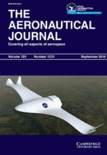
AERONAUTICAL JOURNAL
Pioneering research in aeronautical engineering.Aeronautical Journal, published by Cambridge University Press, is a premier scholarly journal dedicated to advancing the field of aerospace engineering. With a notable impact factor, this journal holds a strong position in the academic community, ranked #53 out of 153 in the Scopus category of Aerospace Engineering, placing it in the 65th percentile. The journal has been providing a platform for groundbreaking research since its inception in 1969, and continues to be a vital resource for researchers, professionals, and students involved in aeronautics. As a Q2 journal in the 2023 Aerospace Engineering category, it offers high-quality articles that cover a range of topics within the discipline, contributing to the ongoing discourse and innovation in aerospace technologies. Although not an open-access journal, it remains accessible to a vast readership through institutional subscriptions and partnerships. The Aeronautical Journal is a crucial publication for those seeking to stay at the forefront of aerospace research and development.
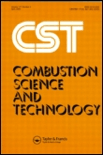
COMBUSTION SCIENCE AND TECHNOLOGY
Exploring the Dynamics of Combustion ScienceCOMBUSTION SCIENCE AND TECHNOLOGY, published by Taylor & Francis Inc, is a pivotal journal in the fields of Chemical Engineering and Chemistry, with a robust history spanning from 1969 to 2024. With an established impact factor and a strong reputation reflected in its Q2 ranking in both Chemical Engineering and Chemistry, this journal serves as an essential resource for researchers and professionals dedicated to the intricacies of combustion processes and energy technologies. The journal also holds commendable rankings in Energy Engineering, Fuel Technology, and Physics and Astronomy, showcasing its interdisciplinary relevance. While currently not an open-access publication, it offers a wealth of knowledge through its meticulously peer-reviewed articles, which are crucial for advancing understanding and innovation in combustion science. With a commitment to promoting rigorous research and fostering scholarly communication, COMBUSTION SCIENCE AND TECHNOLOGY is indispensable for anyone seeking cutting-edge insights into combustion phenomena and their applications in various engineering fields.
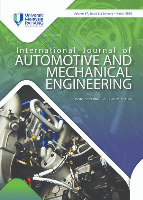
International Journal of Automotive And Mechanical Engineering
Navigating the Frontiers of Automotive and Mechanical InnovationThe International Journal of Automotive and Mechanical Engineering (IJAME), published by Universiti Malaysia Pahang, serves as a premier platform for the dissemination of cutting-edge research in the fields of Automotive and Mechanical Engineering. Established in 2010, this Open Access journal not only ensures that high-quality research is freely accessible to the global community but also reflects its commitment to advancing knowledge in these crucial engineering domains. With an impressive standing in the 2023 Scopus Ranks, achieving a Q3 ranking in both Automotive Engineering and Mechanical Engineering, IJAME proudly showcases a diverse range of articles that address contemporary challenges and innovations. Positioned in Malaysia and aimed at researchers, professionals, and students alike, this journal invites contributions that explore the intersection of theory and practice within automotive technologies and mechanical design. Join a growing international community that is shaping the future of engineering through open collaboration and knowledge sharing.